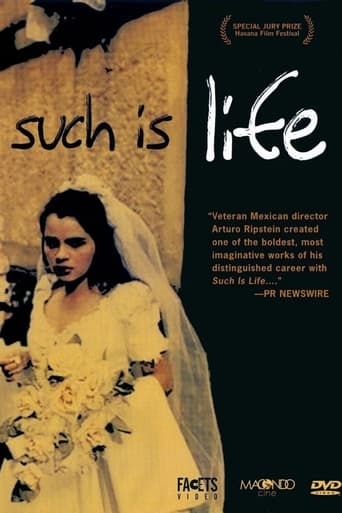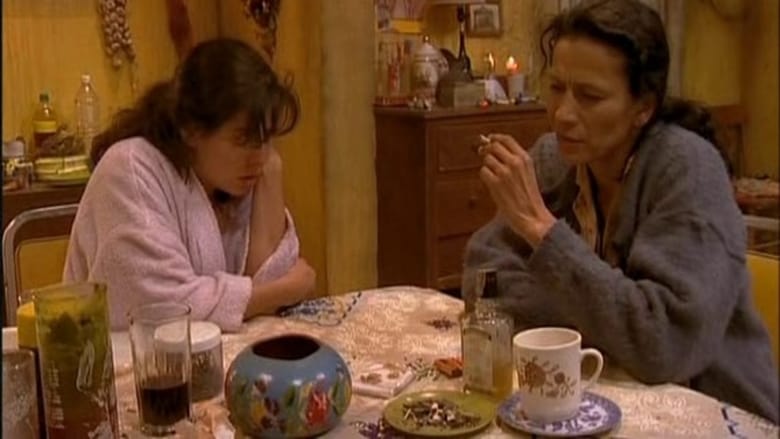

Such is Life (2000)
After her husband leaves her for a younger woman, Julia plans her revenge with the help of her grandmother.
Watch Trailer
Cast
Reviews
the leading man is my tpye
A story that's too fascinating to pass by...
This is one of the few movies I've ever seen where the whole audience broke into spontaneous, loud applause a third of the way in.
Just intense enough to provide a much-needed diversion, just lightweight enough to make you forget about it soon after it’s over. It’s not exactly “good,” per se, but it does what it sets out to do in terms of putting us on edge, which makes it … successful?
The format of this film is typically theatrical. There are many soliloquies in which the character tells us how hard life is, the misfortunes that have beset the family and the uncertainty of the future. There are discussions between mother and daughter, arguments between husband and wife, and threats from an unrelenting landlord. There is a very slow fade between the numerous scenes like a theatrical curtain change. Surprisingly there is also a chorus of four who appear at odd times with appropriate songs. They philosophize on life as in some Greek drama. And why not? This happens to be a modern Mexican version of the classical Greek play "Medea".I normally dislike modern versions of the classics....often experimental attempts at presenting something different that is rarely successful. Not so here. This is an amazing drama that should not be missed. It is so different, so unique, so powerful it will remain in your thoughts for days. What we see on the screen is no fairy story. It is as relevant to-day as in the days of ancient Greece. Just read the daily newspapers and you will see what I mean.Nicolas a young and not so successful boxer is supported by his wife Julia who dabbles in herbal mixtures and witchcraft to augment the family income. They have two young children. When Nicolas falls in love with the landlord's daughter and seeks a divorce, the future of the children becomes a major concern. The outcome is horrendous.Nicolas and Julia pour out their intimate thoughts as we watch the love that once they had for each other evaporate before our eyes. There is a sense of tragedy and impending doom wonderfully portrayed by the actors as we watch helplessly in desperation and the chorus from time to time reinforces our thoughts.I liked very much the summing up by Nicolas in the final scene. Whenever tragedy overtakes us, it is difficult to assert who is to blame. The message in the film seems to suggest that it is rarely the fault of one person. Indeed,we must all accept some share in the responsibility. Such is life!
The sublime, visual poeticness of `El Coronel no tiene quién le escriba' (qv), without any doubt one of the most beautiful films in Spanish from either side of the Atlantic, used beautiful photography, music and two excellent actors to build up an exquisitely atmospheric film evoking sincere pathos, such that the impact is tenderly psychological.With `Así es la Vida' all that has gone; the subtleties of `El Coronel no tiene quién le escriba' (Gabriel García Marquez) are thrown out in favour of double-handed axe blows which obviate the outcome way before you get there. It seems as if Arturo Ripstein sought to bombard the spectator into oblivion with a pathologically overwrought story reaching extremes of visual violence which are not really justified. In this, his wife, Paz Alicia Garciadiego, is to blame. Her careful adaptation of Gabriel García Marquez's short novel, here becomes a `machaconic' bombast of disproportionate savagery. The film kills itself from its own blunt heavy-handedness, such that one tends to think that Mrs. Garciadiego-Ripstein was hell-bent on vomiting up her own masochistic `macho' feelings, rather than telling the story in a more heart-felt way: the result on the viewer may well have been just as powerful, without resorting to such exaggerated extremes.Neither the presence of Tovar nor Yáñez lend much to the proceedings, unfortunately: the film derails around them. Added to that is the frustration of trying to work out a very marked Mexican accent which often left me half-guessing some of the dialogues. I do not usually have any difficulty with the regional varieties of Spanish on the American side of the Atlantic, but in this film, the going was definitely `muy chingadera'.I hope that a far better conclusion can be made after seeing the next Ripstein-Garciadiego film `La Virgen de la Lujuria' with Ariadna Gil and Juan Diego. If not, I can only suggest that Ripstein change scriptwriter, if not wife ..
Así es la vida is the first latin american digital film transfered to 35mm. For those who didn't understand it, it's a contemporary version of Sénecas' Medea, a greek tragedy. So don't complain about the script because that was the intention of all that complex language. Based on this story, the film is excellent, the scenario and the ambient are very well mixed with the movement of the camera, so you get long scenes but not monotonous. For me, displaying the trio as a the chorus of a greek play was an excellent idea. Although is a little strange film, a Ripstein's film, for me the way they treated the character of Julia wasn't that strange. How she remains homeless happens at least here in Mexico City, how she is cheated, etc. So it's curious how a very old tragedy it's well adapted to our days. So, finally, it's a very good experiment in digital video, it's a simple story maybe, but with a lot of details on it.
I was so enthusiastic for this film... before seeing it. "Así es la vida" is the first latin american commercially released film shot on digital video (Pal system, of course) and, beyond that technical achievement, it´s of little interest. The movie shows (and, as usual in Ripstein, into a sordid scenario) a woman complaining and punishing herself because her husband left her and went away with another (younger) woman. When the man comes back for taking the kids with him, then she will decide how to take revenge...I think the question here is: how long, as a viewer, can you stand a woman complaining without anything actually happening? Certainly there is no dramatic progression -perhaps the film would have worked better if the story showed this couple from the beginning of the relationship so we could follow their degradation- and the characters are so cliché... it´s obvious Ripstein here is using the sordid elements not to reveal the depths of his characters but simply to shock us gratuitously. As always the dialogs are soup-opera kind, but here they just don´t work and seem a little pretentious. Visually, the film lacks appeal. The director uses long one-shot takes that give the movie a monotonous feeling. Anyway, I must say that the election of the DV -with all its imperfections- as format helps a lot to build the atmosphere and the decoration is just brilliant.Some OKs, like using the tv and the musical group to show the feelings of the characters, a very funny take (above all, the film has a certain black humor that I appreciate) where we see the very same Ripstein through a mirror, don´t save this picture. By the way, it feels like he has seen Von Trier´s "Breaking the waves" a lot... If you have seen Ripstein´s best "Principio y Fin" then you have already seen "Así es la vida". Hmmm.


